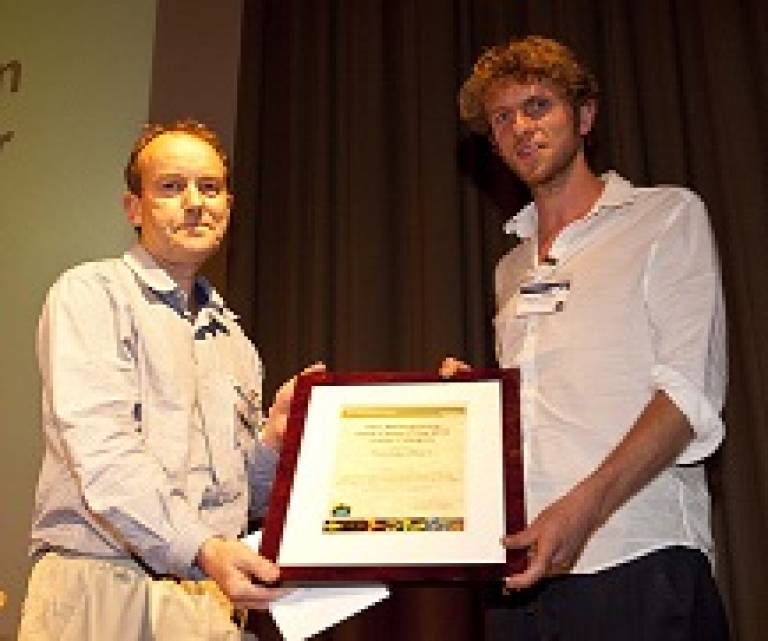2nd Annual UCL Neuroscience Early Career Prizes Awarded
9 July 2012
Congratulations to Drs Thomas Akam, Lorenzo Fabrizi and Rebeccah Slater, who were each awarded UCL Neuroscience Early Career Prizes at the UCL Neuroscience Symposium 2012.
 The winners
received prize cheques and certificates from Professor Trevor Smart, UCL Neuroscience
Domain Chair, and Dr Akam and Dr Fabrizi also gave a presentation about their
research at the symposium held on Friday 29 June at the Institute of Education.
The winners
received prize cheques and certificates from Professor Trevor Smart, UCL Neuroscience
Domain Chair, and Dr Akam and Dr Fabrizi also gave a presentation about their
research at the symposium held on Friday 29 June at the Institute of Education.
Dr Akam, now a Sir Henry Wellcome Postdoctoral Fellow at the Gatsby Computational Neuroscience Unit, was awarded the Junior category prize for his paper, Oscillatory dynamics in the hippocampus support dentate gyrus-CA3 Coupling which was published in Nature Neuroscience and conducted whilst he was studying for a PhD at the UCL Institute of Neurology.
Upon receiving his award, Dr Akam said: "I felt honoured to receive the prize given the strength and breadth of Neuroscience research at UCL. It was a privilege to present the work to this audience and I really appreciated the feedback I received after the talk."
The Advanced category prize was jointly awarded to postdoctoral researcher Dr Lorenzo Fabrizi and Wellcome Trust Career Development Fellow, Dr Rebeccah Slater, both from the Research Department of Neuroscience, Physiology and Pharmacology, for their Current Biology publication, A shift in sensory processing that enables the developing human brain to discriminate touch from pain.
Dr Fabrizi commented enthusiastically: "On hearing the news about receiving the UCL Early Career Neuroscientist prize I jumped off my chair! This is a great honour especially in such a thriving community as that of UCL Neuroscience. For the 3rd year in a row the UCL Neuroscience Symposium has been a wonderful success. Bringing the neuroscience community together is a great occasion for developing prolific and fruitful collaborations and for enhancing the profile of UCL Neuroscience worldwide. I am very grateful and delighted to have had the opportunity to present our research at this prestigious gathering in the presence of scientists of such high calibre."
Joint winner Dr Slater said: "It was a delight to win the ECN prize with Lorenzo. Winning this prize together has highlighted the benefits of doing interdisciplinary research. By bringing together expertise from different disciplines we have been able to address fundamental questions about the development of the human brain." She continued: "The neuroscience symposium day was a fantastic event and showcased some of the best work that is currently being done at UCL."
The UCL Neuroscience Early Career Prize was first awarded in 2011 and while 'local' in its aim to encourage and reward UCL early career neuroscientists, it is truly an indicator of future success beyond UCL. 2011 Junior category winner, Dr Tiago Branco has since won the 2011 Grand Prize in the annual international competition for The Eppendorf & Science Prize for Neurobiology, for his essay, "The Language of Dendrites."
Images: Top: Dr Thomas Akam, Middle: Dr Lorenzo Fabrizi, Bottom: Dr Rebeccah Slater, all receiving their prizes from Professor Trevor Smart. Medical Illustration, UCL Institute of Neurology, UCLH NHNN.
Summary of Dr Thomas Akam's prize winning paper:
Human and animal brains generate complex patterns of oscillatory activity colloquially known as 'brain waves', which vary dynamically during cognitive tasks. The functional role of these oscillations is poorly understood, but it is thought that synchronised oscillatory activity across distributed brain regions may play a role in flexibly controlling the flow of signals through the brain. Our study aimed to better understand how oscillations generated by local circuits become synchronised with each other through long range connections. Our approach was to study how oscillations induced in local networks in slices of brain tissue responded to simple stimuli, and try and understand this behaviour using computational models. Our results suggest that the dynamics of oscillating local circuits provide mechanisms for oscillatory coupling of activity between regions.
Oscillatory dynamics in the hippocampus support dentate gyrus-CA3 coupling. Nature Neuroscience 15, 763-768 (2012). Thomas Akam, Iris Oren, Laura
Summary of Dr Lorenzo Fabrizi and Dr Rebeccah Slater's prize winning paper:
When infants begin to discriminate pain from gentle touch and how this occurs is a fundamental question in neuroscience. However, little is known about the development of the necessary prerequisites in the human brain. In this study we have explored the changes in brain activity that underlie the maturation of pain and touch discrimination in the preterm infant. Brain activation by tactile and painful stimulation occurs from an early preterm stage but there is a shift in the pattern and specificity of the response with age. We have conducted non-invasive electroencephalogram (EEG) recordings of the brain activity in response to gentle touch and clinically essential lance of the heel in 46 infants aged 28-45 weeks gestation. At early stages of brain development, less than 35 weeks gestation, the dominant response to both touch and painful lance of the heel is a nonspecific neuronal bursts with a higher incidence following painful compared to tactile stimulation. At later stages of brain development, after 35-37 weeks gestation, the dominant response is quite different: touch and lance of the heel now evoke characteristic activities, which are completely separable for the two modalities of stimulation.
The results suggest that specific neural circuits necessary for mature discrimination between touch and pain seem to emerge from 35-37 weeks gestation in the human brain.
A Shift in Sensory Processing that Enables the Developing Human Brain to Discriminate Touch from Pain. Curr Biol. 2011; 21(18): 1552-8. Fabrizi L*, Slater R* (*equal contribution), Worley A, Meek J, Boyd S, Olhede S, Fitzgerald M
Links:
2012 UCL Neuroscience Symposium blog
- An overview
- A vision for multidisciplinary research
- Science for everyone
-
Symposium posters and prizes
Related article:
 Close
Close

